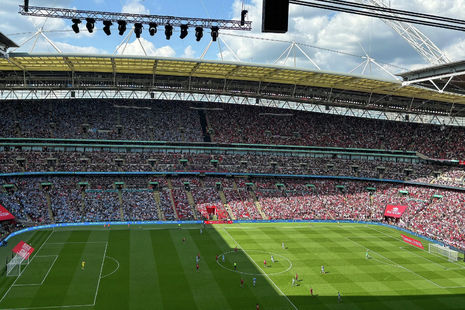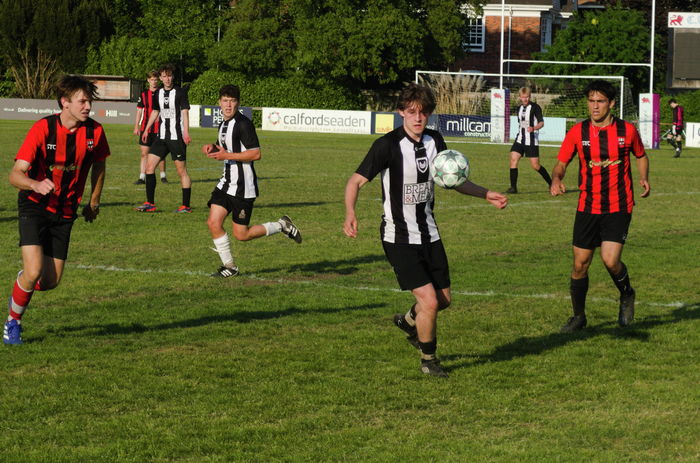The Quiet Death of the FA Cup
Max Eshelby examines the decline of the world’s oldest football competition and what can be done to save it

The FA Cup is dying, and it has been for a while. It suffers silently, bearing a fate that is both painful and undignified for a tournament that was the beating heart of English football for over a century. Pundits constantly speak of the ‘Magic of the Cup’, but let’s not kid ourselves. This so-called ‘magic’ now acts as more of a marketing slogan than it does a reality. Now more than ever, the FA Cup is at risk of being relegated to a mere sensationalised footnote of the modern game – a tragedy driven by English football elites’ financial greed and neglect of tradition.
Crystal Palace’s incredible triumph over Manchester City in this year’s final was undoubtedly a victory for football. It epitomises everything that the tournament has represented: an opportunity for David to defeat Goliath on football’s biggest stage. Palace, who until the 17th May had never won a major trophy, defeated one of the most successful teams in recent times – who have coincidentally been accused of violating financial fair play rules at least 115 times.
But this doesn’t solve the present crisis facing the FA Cup. The FA Cup is not the two clubs that make it to the final. It’s not even the 64 teams that compete from the third round onwards every January. It is a competition of over 700 teams of all shapes and sizes, often beginning before the start of the Premier League season. Many dream of facing a Premier League club, and importantly, the financial security an extended cup run can provide. Yet this dream is slowly evaporating, which only widens the gap between the Premier League and the rest of the footballing pyramid.
The FA Cup’s decline has been evident for some time. In 2000, Manchester United opted not to defend their title, but rather, withdraw in order to compete in the FIFA Club World Championship. 9 years later, United attracted further criticism after fielding a significantly weakened side to face Everton in the semi-finals, owing to United’s involvement in the latter stages of the Champions League. The financial gain of competing in the Club World Cup or winning the Champions League far outweighed the romance of FA Cup glory. It is this sentiment that is killing the tournament as we know it, especially for lower league clubs.
“The hypocrisy is sickening”
In recent years, managers such as Pep Guardiola and Jürgen Klopp have bemoaned domestic cup competitions, believing that they create unnecessary fixture congestion and heighten the risk of injuries. But I struggle to buy this argument. It was announced in April 2024 that FA Cup replays would be scrapped from the first round proper onwards - a move that the EFL claim was made “solely between the Premier League and the FA,” attracting significant condemnation from many lower league teams. Is it a coincidence that, only two months later, the same Premier League sides who had so belligerently complained about fixture congestion welcomed UEFA’s decision to expand the format of the continental tournaments? Player welfare was never at the core of these changes. The hypocrisy is sickening.
As a (long-suffering) Lincoln City supporter, I have seen first-hand just how transformational the FA Cup can be, and why the recent changes to its format are so detrimental to the game beyond the Premier League. In 2017, Lincoln City became the first non-league side to reach the FA Cup quarter-finals in over a century, following an astonishing run that saw the Imps defeat both Championship and Premier League opposition. Having earned over £1 million in prize money, gate receipts, and TV revenue, the club was able to finance the construction of a new training facility, win promotion back to the Football League, and most importantly, reconnect a city with its football team. From Lincoln’s early opener away at Ipswich in the third round until the final whistle of our eventual 5-0 defeat at Arsenal, in moments like these the FA Cup does truly feel ‘magical’.
Now, I wonder if we would ever be able to replicate such a feat.
“Replays were never just extra-fixtures for lower league clubs, but a dream”
In robbing clubs of the evident financial bonus it provides, the removal of replays makes it even harder for ‘cupsets’ to occur. Lincoln were only able to get past Ipswich in the third round in 2017 following a replay - I genuinely do not think the Imps would have progressed had the initial fixture gone to extra time. Take the match between non-league Tamworth and Premier League Tottenham Hotspur in this year’s FA Cup. Tamworth valiantly held Spurs to a 0-0 draw at full time, but rather than a reverse fixture in North London, which would have provided Tamworth with a further source of income, Spurs proved their superior fitness and game management in scoring 3 goals in extra time. Replays were never just extra-fixtures for lower league clubs, but a dream. A replay at the Etihad or Anfield could be enough to keep a club afloat for years to come. But the Premier League moaned and the FA folded.
This isn’t just a financial problem - it’s cultural too. The FA Cup is a symbol of why English football is so special. To win the Cup was the aspiration of any English footballer. Final day was a source of national celebration with a distinct historical continuity: thousands would flock to Wembley, whilst millions would tune in at home to listen to the annual rendition of ‘Abide With Me’ before two clubs battled it out for the chance to win sporting immortality. It meant something to win the FA Cup. Now, it is often just a means of securing the wider project of a domestic ‘treble’, or to guarantee European qualification.
So what can be done? The FA has to do more than just provide lip service to the competition’s heritage. We can’t let the competition erode any further, and a serious effort is needed to both engage clubs and revive interest in the tournament. The Premier League, meanwhile, must be held accountable – if not for their own benefit, then for the health of the wider pyramid.
The FA Cup is still alive, technically. But unless we fight to preserve its meaning, it will be relegated to a museum exhibition - admired for what it once was, mourned for what it could have continued to be. And English football will be forever poorer for its death.
 News / Judge Business School advisor resigns over Epstein and Andrew links18 February 2026
News / Judge Business School advisor resigns over Epstein and Andrew links18 February 2026 News / Hundreds of Cambridge academics demand vote on fate of vet course20 February 2026
News / Hundreds of Cambridge academics demand vote on fate of vet course20 February 2026 News / Petition demands University reverse decision on vegan menu20 February 2026
News / Petition demands University reverse decision on vegan menu20 February 2026 News / CUCA members attend Reform rally in London20 February 2026
News / CUCA members attend Reform rally in London20 February 2026 News / Gov grants £36m to Cambridge supercomputer17 February 2026
News / Gov grants £36m to Cambridge supercomputer17 February 2026










